Emperor of Japan, Meiji and His World 1852-1912, Donald Keene 2002
The most remarkable changes in the history of Japan occured during the sixty year reign of a single emperor, Meiji. Keene’s book tries to unveil the man Meiji about which little is known or has been written.
Emperor Meiji 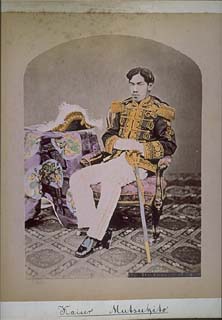
Diplomat Makino Nobuaki said of Meiji:
The emperor had almost no private side to him. He also had no preferences. There was nothing to choose between his living quarters and those the the aristocracy. If anything, his were simpler. They merely served his needs. When he made a journey, it was never for pleasure but always for the sake of the country. He initiated public works but never because of his own tastes; everything was done because it was necessary for the nation. He did not give permission for public building to be erected unless they were needed to receive foreign visitors or for state business. He did not buy things because he wanted them but in order to encourage industry or protect art. He led almost no life apart from his work.
The London Times wrote:
He possessed a remarkable faculty of judging character, and where his confidence had once been given, occasion to recall it never occurred. He possessed also a rarer trait, absolute willingness that others should wear the laurels of success, for he asked of the nation nothing except that it should honour and trust the Throne’s servants, reserving to the Throne only the reverence form of prestige.
Celebration  of Japanese Consitution
of Japanese Consitution
1889 Celebrating the new Constitution of Imperial Japan in Kyoto
The emporer’s name was chosen by casting the I Ching Oracle and deriving a reign name (nengo) from the resulting passage: “The sage, facing south, listens to the world; facing the light, he governs.” The name Meiji came to be interpreted as meaning “enlightened rule”. For the first time in Chinese or Japanese history the reign name Meiji applied to his entire life and was not changed at his death.
King Kalakaua of Hawaii was the first foreign monarch to visit Meiji. Next to Meiji at 5’4″, tall for a Japanese at the time, Kalakaua was a giant. Kalakaua was traveling to Japan unanounced until an American diplomat tipped off the royal court who pulled out all the stops to prepare a welcome worthy of a visiting monarch. For Japan it was a means of learning the practices of Western state visits and protocols. Kalakaua was overwhelmed by the magnitude and scale of his welcome. Kalakaua proposed that his niece Kaiulani, then only five and future Queen of Hawaii, be accepted as bride to Prince Sadamaro, who was later legally adopted by Meiji. Meiji turned Kalakaua down.
Just prior the the outbreak of the Russo-Japanese War, the annual lecture delivered before Meiji was a strangely prophetic reading from David Hume’s History of England describing the defeat of the Spanish Armada by the British. Japan destroyed the entire Russian naval fleet during the war.
President Theodore Roosevelt played a key role in the Russo-Japanese peace negotiations for which he was awarded the Nobel Peace Prize in 1906. The English wife of a Russian prisoner was unimpressed:
Peace as she is hammered out at the American Cronstadt! … Japan and Russia have not made peace – nor wanted it. Oh, no! That terrible American President, Il Strenuoso, he has made it. He wanted it, he would have it. And I believe him capable of locking the conferees in a room and starving them into obedience.
King Edward VII conferred the medieval Order of the Garter on Meiji. When Prince Arthur was buckling the garter below Meiji’s knee he pricked his finger getting blood on the garter. Meiji remained unperturbed and dignified throughout the presentation but once retired to his private chambers, he broke out laughing and asked “What am I supposed to do with such a thing?”
Meiji Ladies 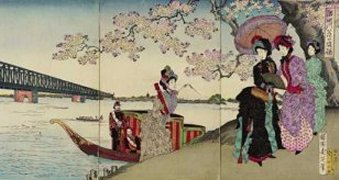 (via) Empress Huruko preferred western style clothing and developed her own style, influencing fashion throughout Japan.
(via) Empress Huruko preferred western style clothing and developed her own style, influencing fashion throughout Japan.
Meiji was fated to be surrounded by enlightened and farsighted advisers including notably Iwakura Tomomi in Meiji’s early life and Ito Hirobumi in Meiji’s later life. He also benefited greatly from the presence of his longtime teacher Motoda Nagazane who taught Meiji to look to the East for moral and ethical guidance even while looking to the West for science, technology, modern universal education, and constitutional governance. Meiji was also greatly assisted in his lifetime duties by the extraordinary Empress Huruko (posthumously known as Shoken)
Meiji’s birth chart

 of Japanese Consitution
of Japanese Consitution (
(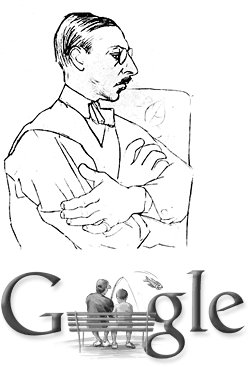 Google Igor or
Google Igor or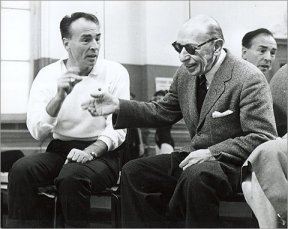

 (youtube)
(youtube)

 Henry Miller
Henry Miller



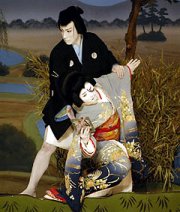 in Kabuki play. (Here he is playing a guy.)
in Kabuki play. (Here he is playing a guy.)
